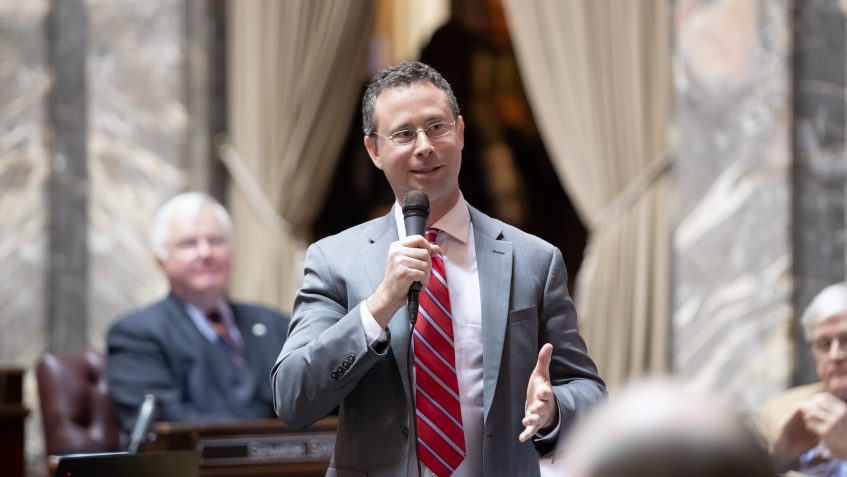OLYMPIA – State Senator Jesse Salomon (D-Shoreline) introduced a bill to rebuild public trust in law enforcement agencies by placing limits on law enforcement collective bargaining agreements related to officer discipline and accountability, and preventing police unions and their employers from setting up privately paid-for disciplinary review systems.
SB 5134 would place several limitations on disciplinary processes for law enforcement officers, such as:
- Prohibiting privately paid-for, for-profit third-party arbitrators from overturning disciplinary decisions by police chiefs;
- Prohibiting police union contracts from negotiating away the rights of community members to secure access to equal and just due process for cases that involve excessive use of force—issues that go beyond working conditions as traditionally defined in contract negotiations.
- Prohibiting contracts that allow sealing, redacting, or destroying records of officer misconduct, allow officers to review video recordings and witness statements prior to giving statements to internal investigators, or limit the authority of civilian oversight boards.
“It is critical that law enforcement have the trust of the community,” said Salomon. “The killing of George Floyd and so many others demands that the relatively few police officers who act in bad faith do not get protected by a special disciplinary review system that doesn’t exist for most employees.
“If I get disciplined at work, I can’t go pay for a lawyer who will sit in judgement of the discipline I received and decide to overturn it. Why should those who hold such a position of public trust have that ability? These contract provisions lead to reduction in discipline and the overturning of termination decisions in about half the cases that are decided. Thus misconduct often goes unpunished, or lightly punished, which significantly undermines public trust.
“No other state has enacted this kind of reform, so Washington lawmakers have an opportunity to lead the way on this much needed change.”
“Police are unique among public employees because they are equipped with deadly weapons and entrusted to protect and serve the people,” said Eric Gonzalez Alfaro, Legislative Director of the ACLU of Washington, a former OPEIU Local 8 union member and former Legislative and Policy Director for the Washington State Labor Council, AFL-CIO. “Police should not be able to use collective bargaining to shield themselves from the consequences of using excessive force or other serious misconduct against members of the public. Collective bargaining is necessary for employees to secure fair wages and working conditions from their employers, but because of the exceptional power over life and death that we as a society give to police officers, the responsibilities to deploy those powers wisely cannot be bargained away.”
SB 5134 would also require all state and local law enforcement agencies to develop transparent policies for investigating misconduct complaints and officer misconduct disciplinary procedures.
“As a former union member, I am a proud supporter of unions. But I believe that collective bargaining should be about negotiating fair wages, good benefits, and employee safety,” said Salomon. “That process shouldn’t be used to shield officers from accountability when they commit egregious acts of misconduct. We place a lot of faith in our law enforcement community. Police officers who abuse their power and violate the public trust need to be held accountable and removed from the law enforcement profession.”
Salomon’s bill is one of several police reform and accountability bills that will be introduced during the 2021 legislative session.
SB 5134 will receive a public hearing on Senate Committee on Labor, Commerce & Tribal Affairs on January 14. The public hearing will be available via livestream and archive video at tvw.org.



